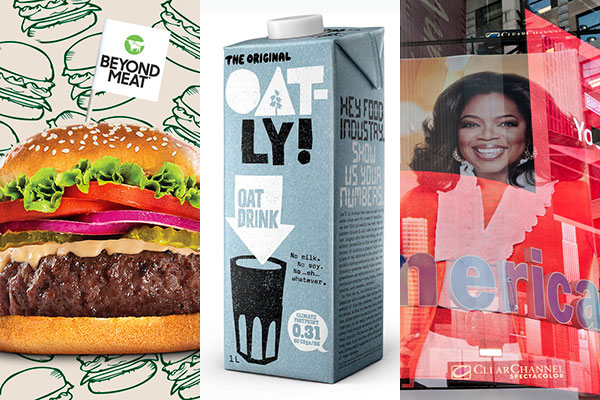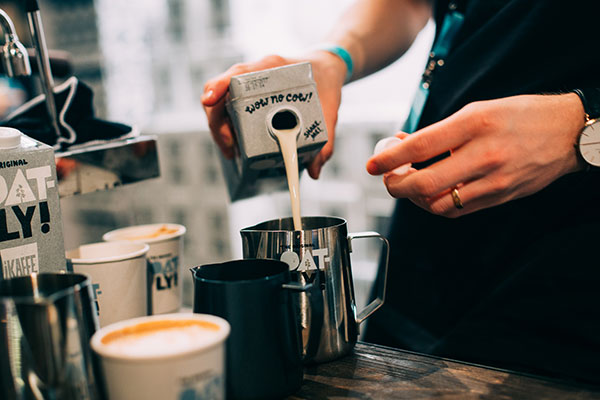Hot sector: should investors put down roots in plant-based foods?
From alt-milk to meat-free burgers, we explore the options for investing in this fast-growing industry.
29th June 2021 09:25
by Nina Kelly from interactive investor
From alt-milk to meat-free burgers, plant-based products are in demand. We explore the options for investing in this fast-growing industry.

How do you take your cup of joe these days? Swedish start-up Sproud is making milk from peas, so coffee drinkers now have that option, as well as the existing dairy-free alternatives such as almond, oat, soya and quinoa, that jostle for dominance in the crowded alt-milk marketplace.
In 2020, global plant-based dairy industry retail sales were estimated to be $18 billion (£12.7 billion), according to Euromonitor, representing approximately 3% of the global dairy industry (excluding soy drinks in China).
As the world strives to feed a growing population while lowering greenhouse gas emissions, particularly methane from dairy and beef herds, plant-based foodstuffs could play a vital role. Demand for such products is also coming from consumers switching to flexitarian, vegetarian and vegan diets on health or ethical grounds, while events such as Veganuary seem to become more popular each year.
- ESG fund speed dating: the key questions to ask to find your match
- Two top stocks for Veganuary
- Baillie Gifford Positive Change: top shares and two new holdings
Alternative products still have environmental impacts, and ESG-minded investors (environmental, social, governance) will need to consider which products they are prepared to back. While almond milk, for example, requires more water to produce than oat milk, it is still less water than a glass of dairy milk, according to the BBC.
So, how can investors gain exposure to plant-based alternatives and sustainable food options?
Company shares
There are a number of individual shares that investors might consider as part of a diversified portfolio.
Perhaps the best-known is California-based Beyond Meat (NASDAQ:BYND), which floated in 2019. The stock has suffered as a result of restaurant closures owing to Covid-19, but it has signed a deal with McDonald’s for its plant-based burger.
International overseas investing expert and interactive investor columnist Rodney Hobson recently examined the stock and observed that: “Sales of plant-based proteins are set to grow 20% a year for the foreseeable future, possibly taking sales beyond $10 billion by the middle of the decade. Currently the switch from meat is being held up by the high cost of plant-based products, which can be priced at two to three times their meat-based rivals.”
Another share to consider is Oatly (NASDAQ:OTLY), a Swedish plant-based milk company, which was founded in the 1990s and floated on the Nasdaq in May. Backers include Oprah Winfrey and rapper Jay-Z.
According to the F-1 prospectus that Oatly filed ahead of its IPO, “on average, a litre of Oatly product consumed in place of cow’s milk results in around 80% less greenhouse gas emissions, 79% less land usage and 60% less energy consumption”.
- Our jargon buster runs through all you need to know about ethical investing
- How investors can guard against ESG fund greenwashing
The Oatly brand is available in more than 20 countries globally, including the US, the UK, Germany and China. At the end of last year, Oatly products were found in 60,000 retailers and 32,200 coffee shops, and the firm had continent-wide partnerships with Starbucks, Target, Tesco and Alibaba.
According to the data firm Nielsen, sales of oat milk products in the US grew by 203% year over year from 2019 to 2020. In the US, oat milk products reached $267 million retail sales during 2020, making it the second-largest dairy alternative after almond milk. In the UK, oat milk reached $181 million retail sales in 2020 and is the largest dairy alternative drink, representing growth year over year of 98% of the UK in 2020, according to IRI Infoscan.
However, firms such as Oatly must contend with Goliaths such as Unilever (LSE:ULVR). Keith Bowman, equity analyst at interactive investor, says: “In November 2020, Unilever announced a new annual global sales target of €1 billion from plant-based meat and dairy alternatives, within the next five to seven years. Vegan alternatives from its brands, including Hellmann’s, Magnum and Wall’s, are being pursued.”
Unilever is not the only global brand making strides in this field and such companies could prove a serious threat to smaller rivals who lack the marketing spend of the leviathans.

Thematic ETFs
One fledgling exchange-traded fund (ETF) available to UK-based investors is the Rize Sustainable Future of Food ETF (LSE:FOOD). Rize says it provides investors with exposure to “global publicly traded companies that are innovating across the food value chain to build a more sustainable and equitable food system”.
Examples of innovation include firms that are “(1) advancing agri-science and digital and precision farming and water management technologies to produce more food with less input resources, and with a reduced environmental impact and carbon footprint; (2) addressing the growing demands of conscious consumers for natural and organic and plant-based proteins and foods; and (3) innovating in areas such as food and ingredient safety and testing and sustainable, reusable and recyclable packaging solutions that help reduce single-use plastic pollution.”
The fund, which tracks the Foxberry Tematica Research Sustainable Future of Food Index, was launched in August 2020, so there is currently insufficient data to provide any meaningful performance statistics.
The ETF invests in 45 companies. Among its top 10 holdings are Beyond Meat; Dutch life sciences firm Koninklijke DSM NV (EURONEXT:DSM), which produces a vegan fish flavour and taste modulator Modumax that can be used in alternative plant-based milks, yogurts and desserts; O-I Glass (NYSE:OI), the world’s largest manufacturer of glass bottles, and several packaging solutions firms.
This ETF is a high-risk option because it invests in small-cap firms that are more vulnerable to economic events. In addition, unpredictable weather conditions, such as drought and floods, as well as fluctuating commodity prices, can hurt many companies connected to food.
The fund has an ongoing charges figure of 0.45%.
Tom Bailey, ETFs editor at interactive investor, says: “Thematic ETFs such as this one give investors a way to access the theme in a diversified manner. As is often the case with innovative new sectors, there are often many companies for investors to chose from but only a handful will likely be successful.
“For those who do not want to try their hand at identifying the winners ahead of time, a thematic ETF tracking a basket of related stocks offers a potentially less risky way to gain exposure. Of course, that’s not to say there is no risk. As can also often happen with a new innovative sector, investor excitement sees related stocks across the board gain in popularity, and therefore price. A change in sentiment, fall in popularity or the failure of the theme/sector to live up to the hype and excitement can result in losses.”
Investment funds
Specialist option Sarasin Food & Agriculture Opportunities is a global equity fund that appears in interactive investor’s ethical longlist, and is categorised as a fund with a sustainability tilt (please see here for definitions). This fund is in our Avoids category, which means that the fund excludes specific companies, sectors or business practices on ethical grounds.
- Ethical investing FAQs: we answer your questions about the ii ethical investment list and how to start investing
- Mind & Money podcast: investing in line with your values
As of 31 May, Sarasin Food and Agriculture’s top five holdings included food services equipment firm Middleby Corp (NASDAQ:MIDD), Dutch life sciences company Koninklijke DSM NV (EURONEXT:DSM)(discussed above),China Mengniu Dairy (SEHK:2319), contract food services firmCompass Group (LSE:CPG), and recipe box delivery service HelloFresh (XETRA:HFG).
The fund’s largest geographical exposures are to North America (31.6%), Europe (27.6%) and the UK (23.7%). On a sector basis, its largest exposures are to consumer staples (36.2%), consumer discretionary (26.1%) and materials (22%).
At the time of writing, its total return performance on a one, three and five-year view is 25.9%, 21.9% and 76%, respectively.
Its ongoing charges figure is 0.99%.
Dzmitry Lipski, head of funds research at interactive investor, says: “Sarasin Food and Agriculture Opportunities fund is a good choice for those who are looking to gain indirect exposure to agricultural soft commodities such as sugar, corn and wheat.
“Agriculture is becoming a more mainstream investment, driven by demand from a growing population. Forecasts suggest the world population will balloon from 7.8 billion today to 9.7 billion by 2050.”
These articles are provided for information purposes only. Occasionally, an opinion about whether to buy or sell a specific investment may be provided by third parties. The content is not intended to be a personal recommendation to buy or sell any financial instrument or product, or to adopt any investment strategy as it is not provided based on an assessment of your investing knowledge and experience, your financial situation or your investment objectives. The value of your investments, and the income derived from them, may go down as well as up. You may not get back all the money that you invest. The investments referred to in this article may not be suitable for all investors, and if in doubt, an investor should seek advice from a qualified investment adviser.
Full performance can be found on the company or index summary page on the interactive investor website. Simply click on the company's or index name highlighted in the article.